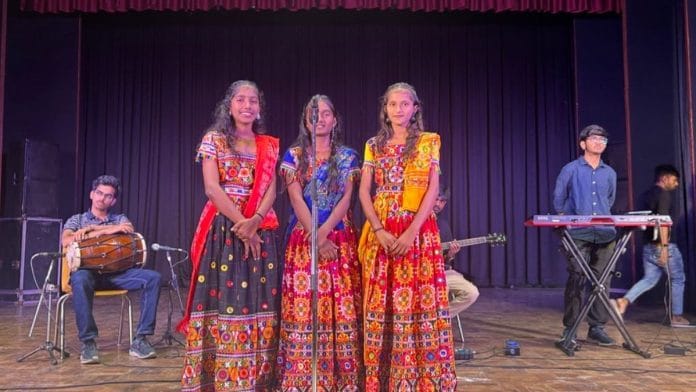New Delhi: It has been a long and arduous journey for three Pakistani Hindu children seeking Indian citizenship. When they sang the traditional Rajasthani song Dharti Dhorari at IIT Delhi’s 2024 Rendezvous festival, it was more than just a performance—it symbolised their hope for a future in India.
Aarti Bhil (13), Ajni Bhil (14), and Reshma Bhil (15) belong to the Bhil community of Pakistani Hindu refugees, who captivated the IIT-Delhi audience with their song recital. Their performances marked an unbreakable bond with their ancestral land, and their yearning for a place to call home.
“I never imagined I would perform at such a prestigious institution,” Ajni told ThePrint. She dreams of becoming an IAS officer. “My father wants to see me in the IAS uniform.”
Their traditional song celebrates the dunes, the sacrifices of women, and the geographical beauty of Rajasthan, said Swati Goel Sharma, co-founder of the Sewa Nyaya Utthan Foundation. It evokes “a deep sense of pride and connection to their homeland,” added Sharma, whose organisation works to uplift marginalised communities such as the Pakistani Bhils.
Both Aarti’s and Ajni’s parents, who arrived in India in 2013, received their Indian citizenship this year, including Aarti’s 21-year-old brother Dilip. Besides the two girls, Reshma and her parents, who arrived in 2019, have yet to become Indians legally.
Pakistani Hindu refugee children like them are supported by the Delhi-based Sewa Nyaya Utthan Foundation, which oversees their education, clothing, food, and other basic needs. The NGO registered Aarti, Ajni, and Reshma to perform at Rendezvous, bringing them to Delhi from the migrant village of Gangana in Jodhpur and training them to sing on stage.
Indian citizenship dream
Aarti’s father Dehraj made up his mind to leave Pakistan for good after the brutal murder of his older brother in 2011 over unpaid rent for a cab he drove. “I sought justice, but the Pakistani administration failed us,” Dehraj said. Frustrated and helpless, he made his way to Delhi, from where he secured a visa to Jodhpur, their ancestral home.
The Sindhi song Albelo India Jave narrates the story of two brothers divided—one remains in Pakistan while the other journeys to India. It reflects themes of love and departure, capturing the hardship of refugees like the three performers.
“It is often sung during farewells, especially as people leave for India on Fridays when the train between the two countries runs,” said Dilip, Aarti’s brother who received Indian citizenship on 13 October.
According to Ajni’s brother Bhaagchand (22), their living conditions have improved significantly since their parents received Indian citizenship. Access to electricity and running water alleviates their fear of deportation, he said.
“I have seen my old house and often talk to my relatives through WhatsApp video calls. I want to see them again in person,” Reshma said, her words expressing the emotional weight of her family’s separation and her hopes for reunification.
Also read:
‘Our children should move forward’
Before the arrival of the Citizenship Amendment Act (CAA), the Pakistani Hindu refugees lived in constant fear of deportation. These families, facing religious persecution in Pakistan, sold their properties to purchase gold jewellery and fund their journey to India—an effort usually met with heartbreak.
“My relative sold everything for gold but was denied a visa to India, leaving them with nothing,” said Dilip.
Getting a passport before 2014 would cost around Rs 25,000 to Rs 30,000, recalled Bhaagchand, who is currently pursuing his Bachelor’s degree in arts from a government college in Jodhpur and is awaiting Indian citizenship. For families fleeing oppression, such financial demands posed overwhelming obstacles in their quest for safety and a better future.
“Majdur hai majduran hi rhenge, bas humare bachche aage badh jaayein (We are labourers, and we will remain labourers; we just want our children to move forward),” said Mehtab, Reshma’s father. He wants his children to secure government jobs after receiving Indian citizenship.
“I am blessed that my kids get to travel to Delhi and perform there,” Dehraj proudly said. “Ab hum pure Bhartiya ban jaayein bas (Now, we just hope to become Indians completely).”
(Edited by Zoya Bhatti)






